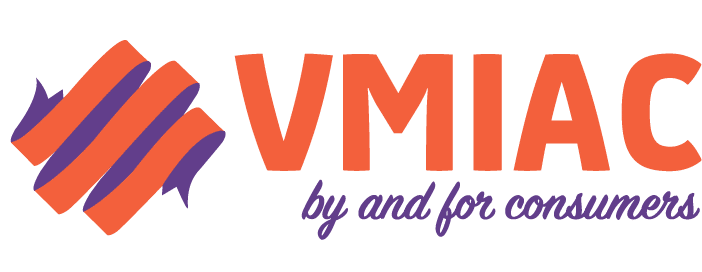Thank you to everyone who contributed to a celebration of lived experience at the VMIAC UnConference 2023! We are so proud and grateful for all who showed up and made the event so special. It has been our privilege to host around 200 people at the UnConference over two days, and allocate 15 consumer bursaries.
We thank all the presenters, who had delivered 33 unique activities centering the power of lived experience in social change. The passion, expertise and strength of the community shone through, especially in the areas of social and emotional wellbeing, criminalisation, family violence, and peer work. Our community continues to showcase its strength in creative expression of lived experience in activities such as badge-making, singing, napping and spoken word.
Our appreciation goes out to sponsors Wellways, NEAMI National, VIC-TAS Alliance of Public Health Networks, Independent Mental Health Advocacy, Centre for Mental Health Learning, Flourish Australia, Mental Health Tribunal and Mind Australia. Together they contributed $51,500 in sponsorship to make the UnConference possible. Thank you for believing in us and contributing to the creation of a space for our community to connect, learn, and find strength across our differences.
Last but not least, thank you all for all your positive input and constructive criticism. We may not have gotten everything right, but your feedback will help us improve the VMIAC UnConference in its next iteration. See you at the next UnConference!
Keynote Summaries
Day 1: Maggie Toko, Consumer Commissioner, Mental Health & Wellbeing Commission
In her keynote address, Maggie Toko gave a personal reflection on her journey from homelessness and compulsory treatment, to her current role as Consumer Commissioner. Her talk highlights the challenges she faced as a person with lived experience who has to contend with diagnostic labels, and structural disadvantage and racism from childhood. Maggie’s story highlights how having lived experience can be difficult, but even more so when one is trying to understand work through their own identity, family, and history.
Day 2: Nerita Waight, CEO, Victorian Aboriginal Legal Service
Nerita Waight’s keynote yarning circle illuminated the experiences of Aboriginal and Torres Strait Islander communities in the mental health system and criminalisation, which have had negative impacts on her family. She drew attention to the deaths of two Aboriginal women, demonstrating the immense cost of institutional failures for Aboriginal and Torres Strait Islander communities. Nerita’s keynote ended with a nine-point call to action, which was met by applause by the audience.
- All Aboriginal and Torres Strait Islander peoples should be able to access and receive culturally safe and trauma informed health and mental health services, this includes equitable services where they may be incarcerated.
- Aboriginal Community Controlled Health Organisations (ACCHOs) are sustainably resourced to provide health and mental health services, as is in line with the right to self-determination.
- All mainstream health and mental health providers commit to embedding a cultural safety policy, that includes provisions to employ Aboriginal health and mental health workers, alongside mandating ongoing cultural safety and anti-racism training for all staff
- There must be Aboriginal mental health workers available in mainstream health providers, including hospitals, and these workers must be consistently consulted to ensure they are able to meaningfully support Aboriginal patients.
- There needs to be Aboriginal Social and Emotional Wellbeing teams established within ACCHOs.
- The introduction of flexible mental health support packages, similar to flexible family violence support packages available, as to better support the social and emotional wellbeing of individuals with mental health conditions.
- That there should be a community health model in prisons rather than private or for-profit providers and ACCHOs can deliver health services to Aboriginal people who are incarcerated.
- Prison healthcare providers should be mandated to employ Aboriginal health, social and emotional wellbeing officers at all prisons, and all incarcerated people should have access to the PBS, MBS and NDIS
- Visit VAL’s website and view their policy positions, including calls for law reform here.
Photos
What’s Next
More stories from the UnConference, along with videos, will be available in 2024. Watch this space!









